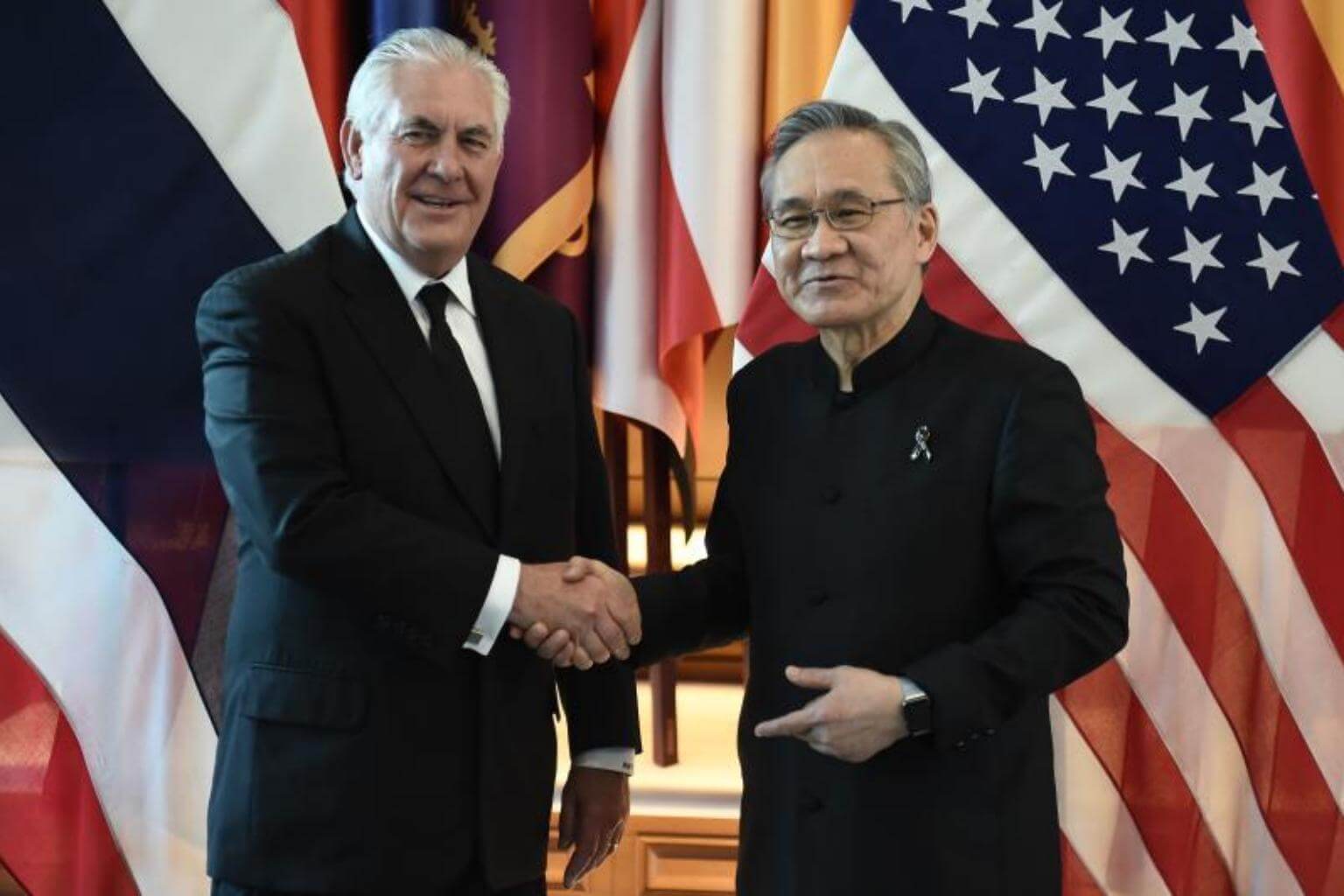US Secretary of State Tillerson reaches out to Thailand amid North Korea, South China Sea tensions
Sign up now: Get insights on Asia's fast-moving developments

US Secretary of State Rex Tillerson (left) shakes hands with Thai Foreign Minister Don Pramudwinai at the Ministry of Foreign Affairs in Bangkok during a one-day visit to Thailand on Aug 8, 2017.
PHOTO: AFP
BANGKOK - Visiting US Secretary of State Rex Tillerson discussed regional security and investment in meetings with Thai leaders on Tuesday (Aug 8) as both countries sought to bring relations back on even keel.
Washington is reaching out to key actors in the region as security fears loom over North Korea's nuclear programme and territorial disputes in the South China Sea.
Mr Tillerson, the most senior US official to visit the Kingdom since its 2014 coup, met Prime Minister Prayut Chan-o-cha and Foreign Minister Don Pramudwinai, and also paid respects to the late King Bhumibol Adulyadej.
Washington is reaching out to key actors in the region as security fears loom over North Korea's nuclear programme and territorial disputes in the South China Sea.
Mr Tillerson, the most senior US official to visit the Kingdom since its 2014 coup, met Prime Minister Prayut Chan-o-cha and Foreign Minister Don Pramudwinai, and also paid respects to the late King Bhumibol Adulyadej.
According to US officials, he was to press Thai leaders for more action on North Korea. Thailand, like Singapore and Malaysia, hosts a North Korean embassy. Thailand exported US$73.8 million worth of products to North Korea in 2015, according to the UN international trade statistics database.
Mr Don told reporters after the meeting that trade with the North had dropped 94 per cent from the year before. He added that the issue of human rights was not specifically broached during talks.
Mr Don told reporters after the meeting that trade with the North had dropped 94 per cent from the year before. He added that the issue of human rights was not specifically broached during talks.
Mr Tillerson left for Kuala Lumpur after the meetings. General Prayut is due to visit Washington at the invitation of US President Donald Trump, though no specific date has been set.
Naresuan University lecturer Paul Chambers told The Straits Times: "The Trump administration has been reactive to the changing equilibrium, which has China as the central patron to the region.
"Coming to Bangkok is a way for Tillerson to show the Prayut regime that the US is back in the game."
But Mr Eugene Mark, a senior analyst with S Rajaratnam School of International Studies, cautioned that given the dynamic nature of the Trump administration, "any shift in US foreign policy is highly dependent on the kind of deal Thailand could offer to the Americans".
Thailand and the US are treaty allies but relations hit a low after the military takeover three years ago (2014). The US, under then president Barack Obama, cut military aid to Thailand as it condemned the coup.
The Thai junta bristled at American calls to restore civil liberties and leaned instead on China, opening negotiations for a high-speed rail link to southern China via Laos. Thailand also increased military exchanges with China, and approved the 36 billion baht (S$) purchase of three Chinese submarines in July.
But US-Thai relations have been on the mend even though the Kingdom was one of the countries identified earlier this year (2017) as running up large trade surpluses with the US as Mr Trump sought to scrutinise trade "cheaters".
In February, Washington sent Admiral Harry Harris, head of the US Pacific Command, to open the annual multilateral Cobra Gold military exercise in Thailand. In June, Thailand confirmed its purchase of four Black Hawk helicopters from the US, which has sold the Kingdom about US$380 million worth of military equipment since the 2014 coup.
Mr Tillerson's visit came barely three weeks after Chinese Foreign Minister Wang Yi was in Thailand.


